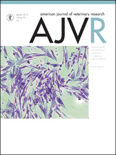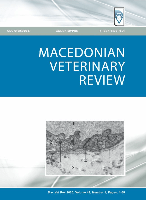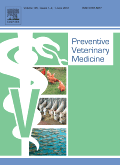
CATTLE PRACTICE
Scope & Guideline
Empowering cattle care with cutting-edge insights.
Introduction
Aims and Scopes
- Veterinary Health and Disease Management:
The journal addresses various health issues affecting cattle, including respiratory diseases, lameness, and gastrointestinal disorders, through clinical audits and research studies. - Sustainability and Environmental Impact:
Research on sustainability practices in cattle farming, including the reduction of carbon footprints and antimicrobial use, is a significant focus, reflecting the industry's shift towards environmentally friendly practices. - Production Efficiency and Best Practices:
The journal publishes studies aimed at maximizing milk production and overall herd efficiency, including innovative practices and technologies in dairy farming. - Antimicrobial Stewardship and Resistance:
A critical area of focus is the responsible use of antimicrobials in cattle farming, including monitoring resistance patterns and promoting best practices for antibiotic use. - Innovative Technologies and Tools:
Cattle Practice explores advancements in technology, such as automated disease detection systems and novel monitoring techniques, to improve cattle health and management. - Education and Training for Veterinary Practitioners:
The journal emphasizes the importance of veterinary education and the practical application of research findings, aiming to enhance the skills and knowledge of practitioners in the field.
Trending and Emerging
- Integrated Health Management Systems:
There is an increasing emphasis on holistic health management approaches that consider the interplay between various health factors, production efficiency, and environmental sustainability. - Climate Change Mitigation Strategies:
Research on strategies to reduce the carbon footprint of cattle farming, including dietary adjustments and methane emission reductions, is becoming more prominent as the industry responds to climate challenges. - Technological Innovations in Cattle Health Monitoring:
The integration of technology, such as automated systems for disease detection and data analytics, is trending as practitioners seek more efficient ways to monitor and manage cattle health. - Collaborative Approaches to Veterinary Practice:
There is a growing trend towards collaborative frameworks involving veterinarians, farmers, and researchers to enhance disease management and promote best practices in cattle health. - Focus on Welfare and Ethical Considerations:
Emerging themes include a stronger focus on animal welfare and ethical considerations in cattle management, reflecting societal demands for higher welfare standards.
Declining or Waning
- Traditional Breeding Techniques:
Research focusing on conventional breeding methods has decreased as newer reproductive technologies and genetic advancements gain prominence in cattle management. - Basic Animal Husbandry Practices:
There is a noticeable decline in studies solely dedicated to basic husbandry practices, as the focus shifts towards more complex and integrated health and production systems. - In-depth Pharmacology Studies:
Papers dedicated to the detailed pharmacological aspects of treatments have become less frequent, possibly overshadowed by broader discussions on antimicrobial resistance and stewardship. - Single-Factor Disease Studies:
Research addressing diseases in isolation without consideration of multifactorial influences is less common, as the emphasis has shifted to holistic approaches that consider environmental and management factors.
Similar Journals

Thai Journal of Veterinary Medicine
Elevating animal health through research and innovation.Thai Journal of Veterinary Medicine, published by Chulalongkorn University, serves as a vital resource for researchers, practitioners, and students in the field of veterinary science. With an ISSN of 0125-6491, the journal has been providing a platform for the dissemination of original research and reviews since its inception, with a focus on advancing veterinary practice and animal health in Thailand and the broader Southeast Asian region. The journal is recognized in the Scopus database, currently ranked in the Q4 category for Veterinary (miscellaneous), reflecting its commitment to quality despite being in a highly competitive space. The scope of the journal encompasses a wide array of topics pertinent to veterinary medicine, ensuring accessibility to diverse veterinary disciplines. While the journal currently does not offer an open-access option, it remains dedicated to contributing valuable knowledge and insights to the veterinary community, supporting the improvement of animal welfare and public health initiatives in the region. As it continues to publish until 2024, the Thai Journal of Veterinary Medicine invites contributions that align with its objectives of fostering scholarly discourse and advancing veterinary research.

BMC Veterinary Research
Championing open access for veterinary excellence.BMC Veterinary Research, published by BMC in the United Kingdom, stands as a pivotal open-access platform dedicated to advancing the field of veterinary science since its inception in 2005. With an impressive impact factor that reflects its influential presence, this journal has achieved a remarkable ranking of #17 out of 194 in the Scopus Veterinary category, placing it in the 91st percentile among its peers. The journal serves as an essential resource for researchers, professionals, and students alike, fostering the dissemination of high-quality research and innovative practices within the veterinary and broader medical communities. With its commitment to open access, BMC Veterinary Research ensures that valuable insights are accessible to all, promoting collaboration and knowledge sharing that drive the advancement of veterinary sciences. As it continues to publish significant findings until 2024, it remains a key contributor to the contemporary discourse on animal health and welfare.

Revista Colombiana de Ciencias Pecuarias
Pioneering Innovations in Veterinary Science and Animal WelfareRevista Colombiana de Ciencias Pecuarias, an esteemed publication in the field of Animal Science and Veterinary Studies, is published by the Universidad de Antioquia, Faculty of Agricultural Sciences. Since its inception in 1996, this Open Access journal has become a vital resource for the dissemination of research and advancements within the agricultural and biological sciences, specifically targeting the veterinary and animal husbandry sectors. Situated in Colombia, its mission is to support and promote scientific knowledge through rigorous review processes and high-quality articles. The journal’s recent classification includes Q4 in Animal Science and Zoology and Q3 in Veterinary categories, illustrating its commitment to enhancing its scientific impact. As it converges from 2008 to 2024, this journal aims to engage researchers, professionals, and students alike, establishing a collaborative environment for innovative research and findings that shape the future of animal sciences globally.

Ankara Universitesi Veteriner Fakultesi Dergisi
Disseminating groundbreaking insights for animal welfare.Ankara Universitesi Veteriner Fakultesi Dergisi is a prominent academic journal published by ANKARA UNIV, focusing on advancements in veterinary sciences and animal biology. Since its inception, the journal has been committed to disseminating high-quality research, featuring articles that span a variety of topics within veterinary medicine and animal science. With an ISSN of 1300-0861 and an E-ISSN of 1308-2817, this journal provides valuable insights into the latest research developments and trends, making it a critical resource for researchers, professionals, and students in the field. The journal has established itself within the scholarly community, achieving a Q3 rank in Animal Science and Zoology and a Q2 rank in Veterinary (miscellaneous) as of 2023, reflecting its growing relevance and impact. Positioned in Turkey, it serves as a vital platform for both local and international scholars to share innovative findings and foster collaboration. Enhancing its accessibility, the journal's content is available through various academic databases, ensuring that its readership can effortlessly access and engage with cutting-edge research.

Translational Animal Science
Bridging Science and Practice for Animal WelfareTranslational Animal Science, published by Oxford University Press Inc, stands as a prominent journal in the fields of Animal Science and Zoology as well as Veterinary Sciences, achieving a commendable Q2 ranking in both categories for 2023. With an E-ISSN of 2573-2102 and transitioning to an Open Access model since 2017, this journal fosters accessibility and dissemination of vital research that bridges the gap between basic animal science and its practical applications. The journal's significant impact factor, where it ranks in the 71st and 65th percentiles respectively for Veterinary and Agricultural and Biological Sciences disciplines, highlights its importance as a resource for emerging trends and innovations in animal research. With submissions accepted until 2024, Translational Animal Science not only contributes to advancing knowledge but also aims to engage a broad audience of researchers, professionals, and students dedicated to improving animal health and welfare. Based in India, the journal serves as an essential platform for the exchange of scientific ideas that facilitate progress within these vital fields.

AMERICAN JOURNAL OF VETERINARY RESEARCH
Advancing Veterinary Science Through Rigorous ResearchAmerican Journal of Veterinary Research, published by the American Veterinary Medical Association, serves as a cornerstone of the veterinary medical community, providing essential insights from 1945 to the present. With an ISSN of 0002-9645 and E-ISSN of 1943-5681, this esteemed journal focuses on a diverse range of topics within the veterinary field, contributing to the advancement of veterinary science through rigorous peer-reviewed research. Ranking in the Q2 category in Veterinary (miscellaneous) and Q3 in Medicine (miscellaneous) category as of 2023, it holds a respectable position in Scopus rankings, further emphasizing its impact in the field. While currently not an Open Access journal, its objective remains clear: to disseminate cutting-edge research that informs clinical practice and enhances animal health and welfare. The American Journal of Veterinary Research is invaluable for researchers, professionals, and students seeking to stay at the forefront of veterinary advancements and innovations.

MAGYAR ALLATORVOSOK LAPJA
Shaping the Future of Veterinary PracticeMAGYAR ALLATORVOSOK LAPJA is a prominent journal dedicated to the field of veterinary science, published by MEZOGAZDA KIADO KFT in Hungary. With its inaugural issue dating back to 1950 and a continued presence into 2024, this journal serves as a vital platform for disseminating research and advancements in veterinary medicine and related areas. While the journal currently holds a Q4 classification in the Veterinary (miscellaneous) category, it provides a critical outlet for emerging findings and perspectives that may not be covered in more mainstream publications. Researchers, professionals, and students engaged in the veterinary field will benefit from its diverse range of articles, which are crucial for fostering knowledge and innovation in veterinary practice. Though it does not offer an open access option, the journal remains an essential resource for those looking to deepen their understanding of the veterinary landscape. The commitment to advancing the field is evident in every publication, making MAGYAR ALLATORVOSOK LAPJA a noteworthy contribution to veterinary literature.

Macedonian Veterinary Review
Fostering knowledge exchange for animal health and welfare.Macedonian Veterinary Review is a prominent open access journal dedicated to advancing the field of veterinary science. Published by SCIENDO, this journal provides a crucial platform for researchers, professionals, and students to share their findings and insights related to veterinary practices, animal health, and welfare. Established with the aim of fostering knowledge exchange since its inception in 2010, the journal has made significant strides, evidenced by its 2023 Scopus ranking of #131 out of 194 in the General Veterinary category, placing it in the 32nd percentile among its peers. The journal's open access model enhances the dissemination of knowledge, ensuring that vital research reaches a wider audience, thereby addressing key issues in the veterinary landscape. With its base in Macedonia and a commitment to high-quality scholarly contributions, the Macedonian Veterinary Review is an essential resource for anyone involved in veterinary research and practice, reflecting the ongoing developments and challenges in this critical field.

Journal of Veterinary Research
Advancing veterinary science for a healthier tomorrow.The Journal of Veterinary Research, published by SCIENDO, is a leading open-access journal dedicated to advancing the field of veterinary science. Established in Poland and accessible globally since 2012, this journal serves as a pivotal platform for researchers, professionals, and students, promoting the dissemination of high-quality research and innovative findings in veterinary medicine. With a robust impact factor reflective of its Q2 ranking in the Veterinary (miscellaneous) category for 2023, it ranks 54th out of 194 in the general veterinary field, placing it in the 72nd percentile among its peers. The Journal of Veterinary Research explores a wide variety of topics pertinent to veterinary practice, animal health, and research methodologies, making it an essential resource for academics and practitioners alike. Authors benefit from the journal's open-access model, which ensures their research is freely available to a broader audience, thus fostering collaboration and innovation within the veterinary community.

PREVENTIVE VETERINARY MEDICINE
Enhancing food animal health through rigorous scientific insights.PREVENTIVE VETERINARY MEDICINE, published by Elsevier, is a premier academic journal dedicated to advancing the field of veterinary science, with a particular focus on the prevention of diseases in food animals. With an impressive impact factor that reflects its stature in the academic community, this journal is categorized in the Q1 quartile across both Animal Science and Zoology and Food Animals categories, underscoring its significance in agricultural and biological sciences. Established in 1982, the journal is known for its rigorous peer-reviewed articles and research insights that contribute significantly to veterinary epidemiology, herd health management, and disease prevention strategies, fostering a closer connection between veterinary practitioners and researchers. By offering a platform for high-quality research that enhances animal health and productivity, PREVENTIVE VETERINARY MEDICINE serves as an essential resource for researchers, veterinarians, and students aiming to stay at the forefront of veterinary innovations and practices.